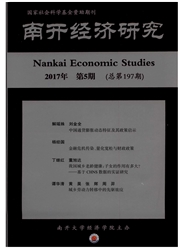

 中文摘要:
中文摘要:
住房价格持续、快速上涨是当前中国最重要的经济和社会现象之一,本文尝试从人口这一基本面因素出发对此做出解读。论文首先以家庭世代交叠模型和古诺形式垄断竞争模型为基础构建了住房市场局部均衡模型,证明外生的人口冲击对住房市场需求和住房价格变化的重要影响。基于30个省级行政区面板数据的实证研究进一步显示,在20世纪80年代(1981年—1991年)生育高峰中出生的人口集中进入婚龄是导致2004年以来中国城市住房价格持续、快速上涨的重要原因之一。上述研究成果提示,这种由于婚姻人口冲击引发的住房市场繁荣具有明显的周期性特征,需要警惕本轮婴儿潮导致的婚龄人口高峰过后可能出现的住房市场需求萎缩和住房价格显著下降以及由此引发的对宏观经济稳定的影响。
 英文摘要:
英文摘要:
The persistent and rapid growth of housing price is one of the most important social economic challenges faced in China in recent years. This paper investigates this phenomenon from the demography perspective. We propose a partial equilibrium theoretical model of housing market based on the household lifecycle consumption framework and a Cournot type of monopolistic competition model. Our new model suggests a positive effect of exogenous fertility rate shock on housing demand and then house price. This hypothesis is also supported by the empirical test using a panel data of 30 Chinese provinces. We find that the housing demand from new marriages of the baby boomers from the 80′s is one of the significant factors contributing to the housing price surge after 2004. It is also evidenced that such demographic driven housing boom is highly cyclical;as a result,when the surge of demand from demographic shock comes to an end,we may encounter a contraction of housing demand,and a shock on macroeconomic stability.
 同期刊论文项目
同期刊论文项目
 同项目期刊论文
同项目期刊论文
 期刊信息
期刊信息
